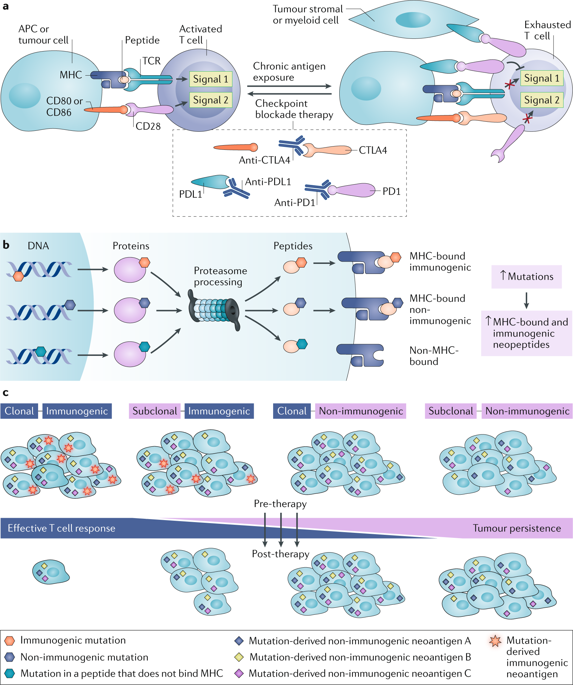当前位置:
X-MOL 学术
›
Nat. Rev. Cancer
›
论文详情
Our official English website, www.x-mol.net, welcomes your
feedback! (Note: you will need to create a separate account there.)
The evolving landscape of biomarkers for checkpoint inhibitor immunotherapy.
Nature Reviews Cancer ( IF 72.5 ) Pub Date : 2019-03-01 , DOI: 10.1038/s41568-019-0116-x Jonathan J Havel 1, 2 , Diego Chowell 1, 2 , Timothy A Chan 1, 2, 3
Nature Reviews Cancer ( IF 72.5 ) Pub Date : 2019-03-01 , DOI: 10.1038/s41568-019-0116-x Jonathan J Havel 1, 2 , Diego Chowell 1, 2 , Timothy A Chan 1, 2, 3
Affiliation

|
Checkpoint inhibitor-based immunotherapies that target cytotoxic T lymphocyte antigen 4 (CTLA4) or the programmed cell death 1 (PD1) pathway have achieved impressive success in the treatment of different cancer types. Yet, only a subset of patients derive clinical benefit. It is thus critical to understand the determinants driving response, resistance and adverse effects. In this Review, we discuss recent work demonstrating that immune checkpoint inhibitor efficacy is affected by a combination of factors involving tumour genomics, host germline genetics, PD1 ligand 1 (PDL1) levels and other features of the tumour microenvironment, as well as the gut microbiome. We focus on recently identified molecular and cellular determinants of response. A better understanding of how these variables cooperate to affect tumour-host interactions is needed to optimize the implementation of precision immunotherapy.
中文翻译:

用于检查点抑制剂免疫疗法的生物标志物的发展。
靶向细胞毒性T淋巴细胞抗原4(CTLA4)或程序性细胞死亡1(PD1)途径的基于检查点抑制剂的免疫疗法在治疗不同类型的癌症方面取得了令人瞩目的成功。然而,只有一小部分患者获得临床益处。因此,至关重要的是要了解驱动反应,抵抗力和不利影响的决定因素。在这篇综述中,我们讨论了最近的研究,这些研究表明免疫检查点抑制剂的功效受肿瘤基因组学,宿主种系遗传学,PD1配体1(PDL1)水平和肿瘤微环境的其他特征以及肠道微生物组等多种因素共同影响。 。我们专注于最近确定的反应的分子和细胞决定因素。
更新日期:2019-02-13
中文翻译:

用于检查点抑制剂免疫疗法的生物标志物的发展。
靶向细胞毒性T淋巴细胞抗原4(CTLA4)或程序性细胞死亡1(PD1)途径的基于检查点抑制剂的免疫疗法在治疗不同类型的癌症方面取得了令人瞩目的成功。然而,只有一小部分患者获得临床益处。因此,至关重要的是要了解驱动反应,抵抗力和不利影响的决定因素。在这篇综述中,我们讨论了最近的研究,这些研究表明免疫检查点抑制剂的功效受肿瘤基因组学,宿主种系遗传学,PD1配体1(PDL1)水平和肿瘤微环境的其他特征以及肠道微生物组等多种因素共同影响。 。我们专注于最近确定的反应的分子和细胞决定因素。






























 京公网安备 11010802027423号
京公网安备 11010802027423号